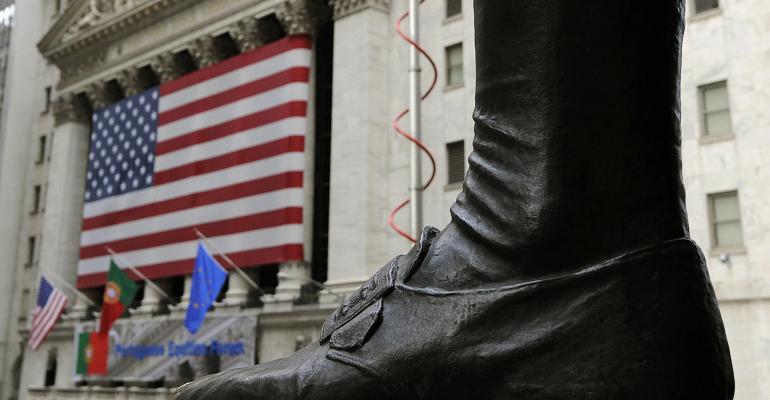The wealth units at the four major wirehouses weathered the COVID-19 storm fairly well during the first quarter of 2020, although advisor head count continued to erode and the expected flight to cash, zero interest rates and slowdown in economic activity cut into assets under management.
Merrill Lynch’s wealth management revenues rose 2% year over year to $4.9 billion, despite AUM falling 7% year over year to $839 billion due to the market decline.
Wells Fargo’s Wealth and Investment Management unit, which spans beyond the Americas, saw its net income fall 20% year over year but rise 82% sequentially to $463 million. The AUM held by the brokerage unit fell 15% from last quarter and 13% year over year to $1.4 trillion.
UBS’s U.S.-based wealth management unit saw operating income up slightly year over year to $2.4 billion for the quarter, but AUM for the unit fell to about $1.2 trillion from $1.4 trillion in the fourth quarter.
Morgan Stanley’s wealth management revenues fell 12% sequentially and 8% from the prior year to about $4 billion. Fee-based assets declined 10% from the fourth quarter but were up 2% from the year-ago quarter at about $1.1 trillion.
Advisor head count at three of the wirehouses continued to fall, with only Merrill gaining, although this was due largely to the fact Merrill counts financial associates in its tabulation. Merrill added 188 advisors since the fourth quarter, bringing total head count to 17,646.
Morgan Stanley lost 36 advisors over the last quarter and 276 from the year prior, ending the quarter with 15,432 advisors. Wells ended the quarter with 13,450 financial advisors, down 3% year over year and down less than 1% from the fourth quarter. UBS lost 53 advisors, with total head count at 6,496 in the Americas.
Morgan Stanley CFO Jon Pruzan said on the company’s earnings call that the wealth management unit was “impacted by two negative factors, movements in investments associated with employee deferred cash based compensation plans and prepayment authorization.” This caused the unit to lose about $500 million in revenues, but he said that the “underlying fundamentals of this business remain quite strong.”
Meanwhile, Pruzan said that due to the market shock, “clients repositioned their portfolios and moved into cash.” He said clients currently hold approximately 23% of assets in cash and short-term securities.
He added that investors would likely return to the equity markets “when the economy opens up again or the work from home ceases and some of the restaurants and businesses get back into business and people feel more comfortable with the outlook.” He couldn’t say when that might happen.
Despite the movement to cash, executives said that more of their clients are seeking professional advice because of the turbulent times, particularly with increased complexity. “Our officers are making contact. Our wealth managers, we are continuing to add accounts in various businesses, not at the rate that you would before. You are seeing the Wealth Management contacts are up. You are seeing even the referrals between our lines of business continue. It’s just at a lower rate because of the necessities of the face-to-face meeting limitations, but those will come back as soon as we can get back in action,” said Paul Donofrio, Bank of America's CFO.
UBS CFO Kirt Gardner noted on his company’s earnings call that a recent investor survey conducted by the Swiss banking giant confirmed that “81% of investors with an adviser are looking for more guidance. And of those who don't have an adviser, 34% are more open to working with one now.”
Gardner said that in the Americas, UBS had an “over 30% year-on-year increase in calls within our wealth advice center.”
In response to a question from Wells Fargo Securities analyst Mike Mayo, Morgan Stanley CEO James Gorman said that he is recovering well from the coronavirus.
As to when the company will be ready to return to its offices, Gorman said that would be up to federal authorities but that “my hope is we’d be able to test people to make sure that they’re healthy and clean and we bring people back in the staggered way as soon as the government lets us do that.”
Overall, Morgan Stanley reported revenues of $9.5 billion, down 13% from the fourth quarter and about 8.4% from a year ago. The company’s earnings per share was $1.01, missing analysts’ estimates by 15 cents.
Bank of America, which owns Merrill Lynch, reported earnings per share of $0.40, missing consensus by 5 cents, on revenues of $22.91 billion, up about 1% from a year ago.
Wells Fargo posted earnings of 38 cents a share, missing consensus by 1 cent, as net income slid to $683 million due largely to a $4 billion provision for credit losses.
UBS said its earnings per share was 43 cents, beating analyst expectations by 3 cents on revenues of $7.93 billion, up 9.8% from the year-ago quarter.





